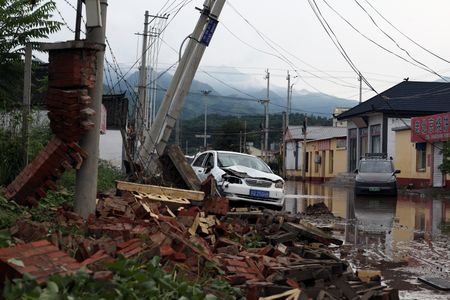HONG KONG (Reuters) -Swollen rivers, waterways and reservoirs across China exacerbated flooding and landslides on Monday which killed at least four people, as authorities warned of more intense rains and heightened disaster risks in coming days.
Forty-one rivers across the country have flooded, state broadcaster CCTV said, citing China’s Ministry of Water Resources. The ministry said it had issued flood warnings for small and midsize rivers and mountain torrents.
Heavy rains intensified around Beijing and surrounding provinces on Monday, including those in central China such as Hunan and northern Inner Mongolia. Four people died in a landslide in northern Hebei and eight people were missing.
In the suburban area of Miyun in Beijing, more than 4,400 people had been resettled after flash floods and landslides inundated many villages, CCTV reported.
At an elderly care centre in Miyun, some people were trapped as water levels rose close to the roof, the broadcaster said. Emergency rescue services swam into the building and used ropes to rescue 48 people.
Images circulated on China’s WeChat app showed areas of Miyun where cars and trucks were floating on a flooded road where water levels had risen so high that part of a residential building was submerged.
Electricity cuts were also affecting more than 10,000 people, in the area, CCTV said.
Northern China has seen record precipitation in recent years, exposing densely populated cities, including Beijing, to flood risks. Some scientists link the increased rainfall in China’s usually arid north to global warming.
China’s Central Meteorological Observatory said that heavy rainfall would continue to drench northern China over the next three days.
Beijing issued its highest-level flood alert on Monday, and its meteorological observatory said rain would intensify after 8 p.m. (1200 GMT), particularly in the second half of the night. Most areas of the city would have more than 150 mm of rainfall in six hours and some areas could reach more than 300 mm, it added.
The storms are part of the broader pattern of extreme weather across China due to the East Asian monsoon, which has caused disruptions in the world’s second-largest economy.
Xiwanzi Village in Shicheng Town, near Miyun Reservoir, was severely affected, CCTV said on Monday, with an additional 100 villagers transferred to a primary school for shelter.
It comes after the maximum flood peak flow into the Miyun reservoir reached a record high of 6550 cubic metres per second, Beijing authorities said on Sunday.
Two high-risk road sections were closed off in Beijing’s Pinggu district, authorities said.
WIDESPREAD
In neighbouring Shanxi province, videos from state media showed roads inundated by gushing currents of water and submerged vegetation including crops and trees.
Shaanxi, home to China’s historic city of Xian, also issued flash flood disaster risk warnings on Monday.
Authorities are carrying out search and rescue work across cities including Datong, where a driver in a Ford car lost contact while driving in the floods, the People’s Daily reported.
Two people were killed and two missing in Hebei province, CCTV said on Sunday morning. Overnight rain dumped a record 145 mm (5.7 inches) per hour on Fuping in the industrial city of Baoding, southwest of the capital.
In Hunan’s Liudiequan grand canyon in Chunkou town, water rose so rapidly on Sunday that a tourist was swept away, CCTV said.
China’s National Development and Reform Commission said on Monday that it was urgently arranging 50 million yuan ($6.98 million) to support Hebei.
The funds would be used to repair damaged roads and bridges, water conservancy embankments, schools and hospitals in the disaster area. The NDRC said it was “promoting the restoration of normal life and production as soon as possible.”
Chinese authorities closely monitor extreme rainfall and severe flooding as they challenge the country’s ageing flood defences, threaten to displace millions and wreak havoc on China’s $2.8 trillion agricultural sector.
($1 = 7.1675 Chinese yuan renminbi)
(Reporting by Farah Master and the Beijing newsroom; Editing by Michael Perry and Kate Mayberry)













